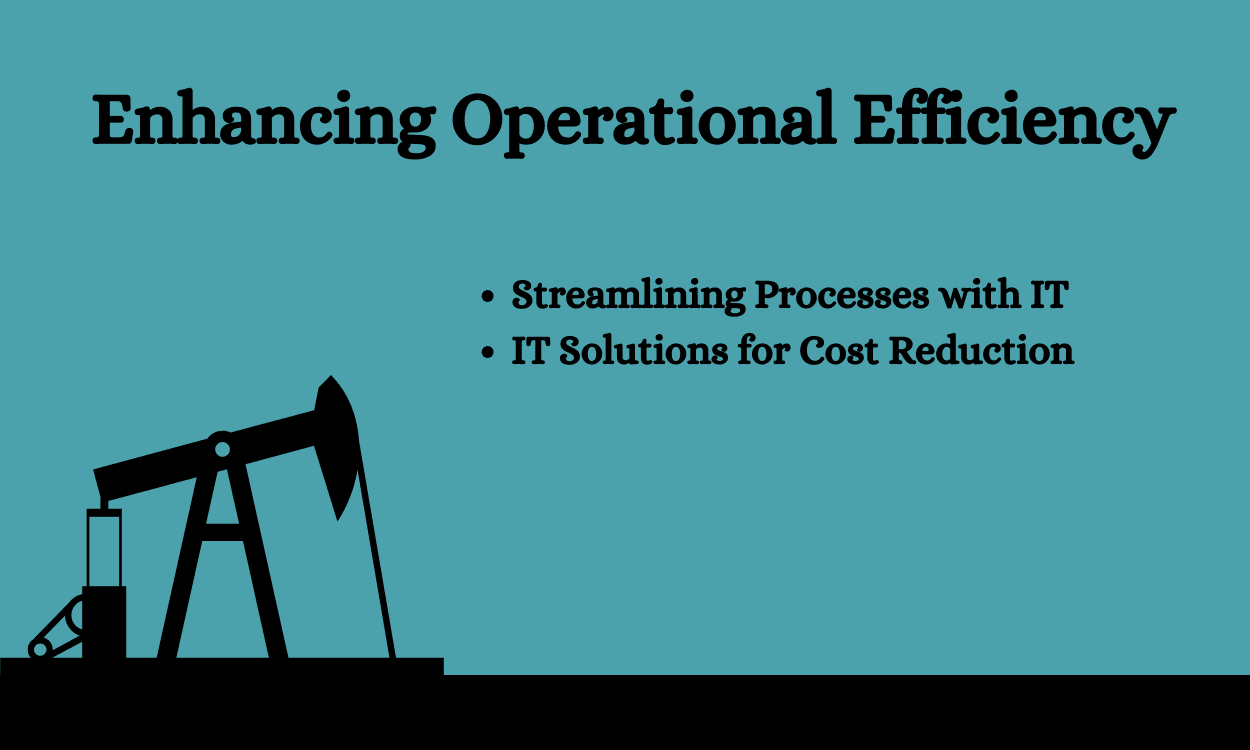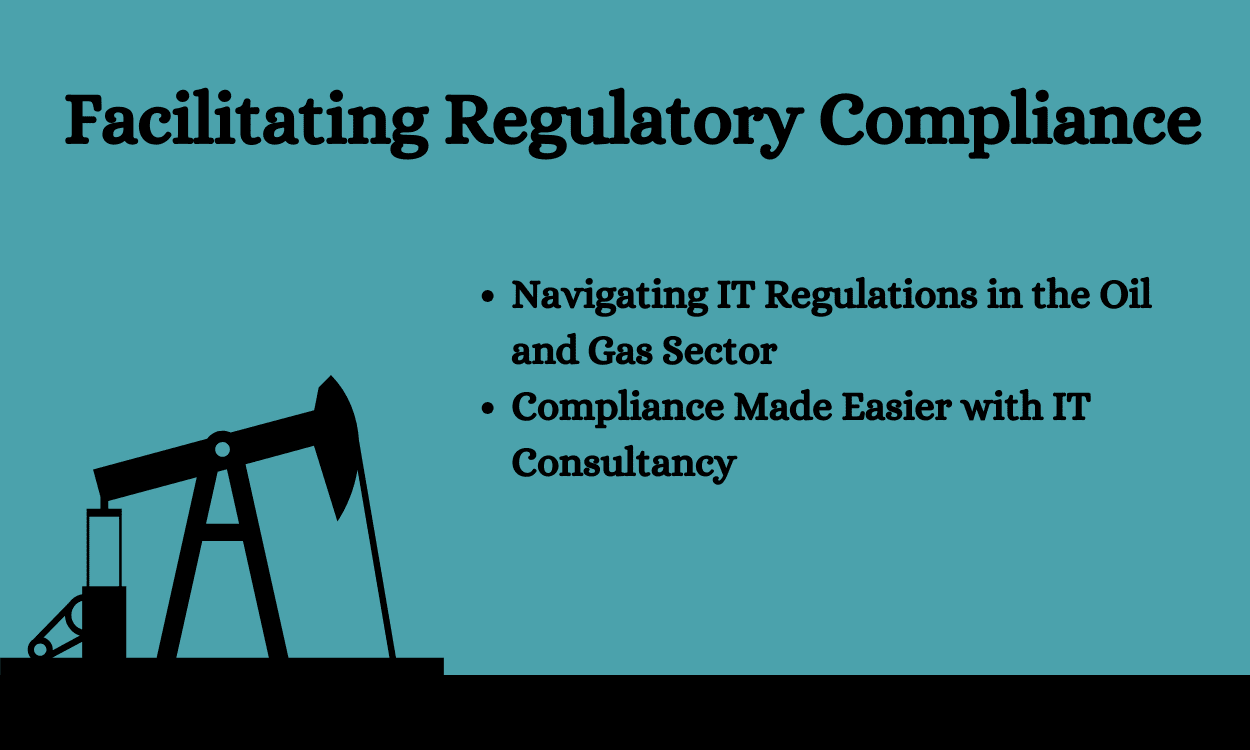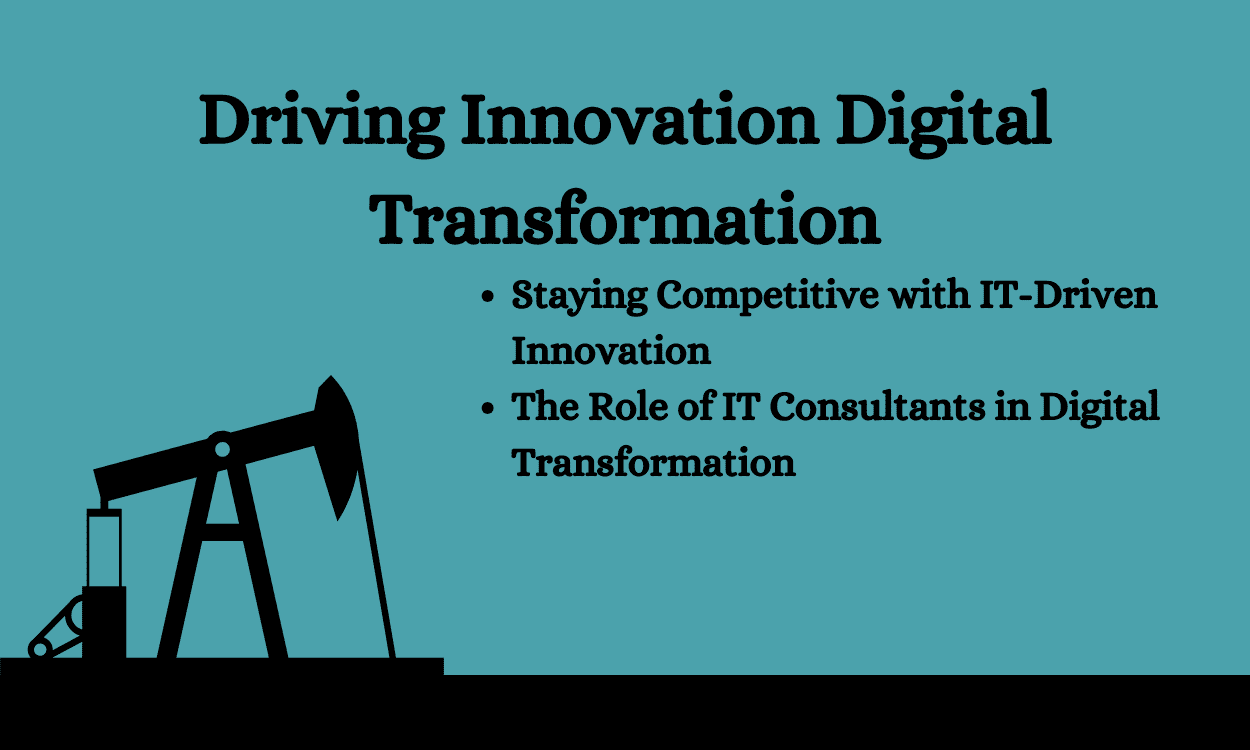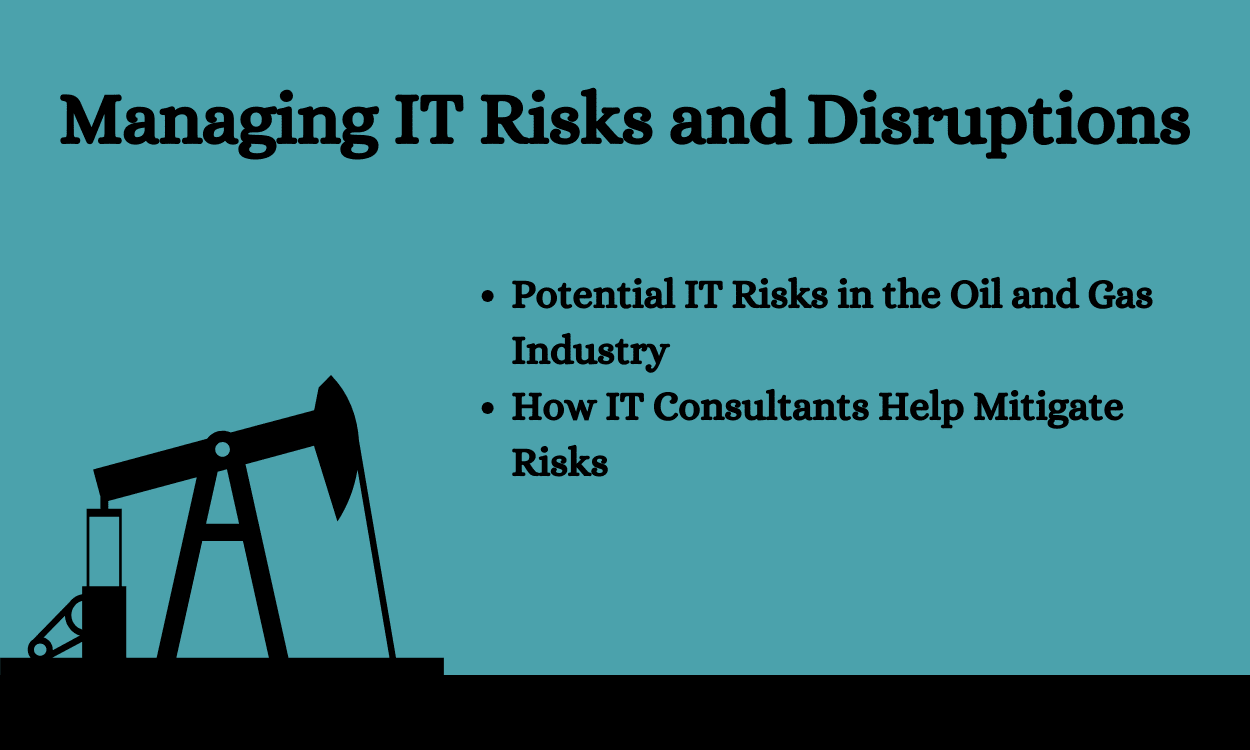In today’s rapidly evolving digital landscape, the oil and gas industry faces unique challenges that can significantly impact its efficiency, security, and compliance with regulations. As technology continues to advance, it is imperative for businesses in this sector to leverage the expertise of IT consultants to stay ahead of the curve. In this article, we will explore five compelling reasons why hiring an oil and gas IT consultant can be a game-changer for companies in the oil and gas industry.
Table of Contents

Understanding the Role of IT Consultants in the Oil and Gas Industry
Before delving into the reasons to hire an IT consultant, it is important to grasp the essence of IT service itself. IT consultancy refers to the practice of providing expert advice, guidance, and solutions related to information technology for businesses operating in various industries, including oil and gas.
Defining IT Consultancy
IT consultancy encompasses a wide range of services, including strategic planning, project management, cybersecurity, data management, and digital transformation. IT consultants not only possess in-depth technical knowledge but also have a comprehensive understanding of the unique challenges faced by the oil and gas industry.
When it comes to strategic planning, IT consultants work closely with oil and gas companies to develop IT roadmaps that align with their business objectives. They analyze the existing IT infrastructure, identify areas for improvement, and propose innovative solutions to enhance efficiency and productivity.
Project management is another crucial aspect of IT consultancy. Oil and gas projects are often complex and require seamless coordination between multiple teams and stakeholders. IT consultants play a pivotal role in ensuring that IT projects are executed smoothly, on time, and within budget. They oversee the entire project lifecycle, from planning and implementation to monitoring and evaluation.
Cybersecurity is a top concern for the oil and gas industry, given its reliance on digital systems and the potential impact of cyber threats. IT consultants help companies develop robust cybersecurity strategies to safeguard critical data and infrastructure. They conduct vulnerability assessments, implement security measures, and provide ongoing monitoring and support to mitigate risks.
Data management is another area where IT consultants provide valuable expertise. The oil and gas industry generates vast amounts of data, from exploration and production to refining and distribution. IT consultants help companies establish efficient data management systems, ensuring data integrity, accessibility, and compliance with industry regulations.
Digital transformation is a key driver of innovation in the oil and gas industry. IT consultants assist companies in leveraging emerging technologies such as artificial intelligence, Internet of Things (IoT), and cloud computing to optimize operations, improve decision-making, and enhance customer experiences. They help organizations embrace digital solutions and adapt to the rapidly evolving technological landscape.
The Intersection of IT and Oil and Gas
Over the years, the oil and gas industry has increasingly relied on various technological advancements to optimize operations, improve safety, and enhance profitability. IT consultants act as catalysts in this process, bridging the gap between information technology and the complex operations of the oil and gas sector.
One area where IT consultants have made a significant impact is in the realm of asset management. Oil and gas companies have extensive infrastructure, including drilling rigs, pipelines, and refineries. IT consultants help implement asset management systems that enable companies to track and maintain their assets effectively. This ensures optimal utilization of resources, minimizes downtime, and reduces maintenance costs.
Furthermore, IT consultants play a crucial role in ensuring the safety and security of oil and gas operations. They help companies implement advanced monitoring systems that detect anomalies and potential hazards in real-time. By leveraging technologies such as sensors, drones, and predictive analytics, IT consultants enable proactive maintenance and risk mitigation, preventing accidents and ensuring the well-being of workers.
Another area where IT consultants add value is in supply chain management. The oil and gas industry involves complex supply chains, spanning multiple regions and involving numerous suppliers and contractors. IT consultants help streamline supply chain processes by implementing integrated systems that enable end-to-end visibility, efficient inventory management, and seamless collaboration between stakeholders. This results in improved efficiency, reduced costs, and enhanced customer satisfaction.
In conclusion, IT consultants play a vital role in the oil and gas industry by providing expert advice, guidance, and solutions related to information technology. Their knowledge and expertise help companies optimize operations, improve safety, and enhance profitability. By bridging the gap between IT and the complex operations of the oil and gas sector, IT consultants enable companies to leverage technological advancements and stay competitive in a rapidly evolving industry.

The Importance of IT in the Oil and Gas Sector
Technological advancements have revolutionized the oil and gas industry, leading to significant improvements in efficiency, safety, and environmental sustainability. The integration of IT solutions has played a pivotal role in enabling these advancements.
The oil and gas industry has witnessed remarkable progress in the field of technology, with cutting-edge innovations such as automation, robotics, artificial intelligence, and the Internet of Things (IoT) revolutionizing traditional processes. These advancements have not only transformed the way operations are conducted but have also opened up new possibilities for exploration and production.
One of the key areas where IT has made a significant impact is in the automation of processes. Automation technologies have allowed oil and gas companies to streamline their operations, reduce human error, and improve overall efficiency. For example, automated drilling systems can continuously monitor and adjust drilling parameters in real-time, leading to increased productivity and reduced downtime.
Furthermore, the integration of robotics in the oil and gas sector has brought about numerous benefits. Robots can be deployed in hazardous environments, such as offshore platforms or remote drilling sites, where human intervention may be risky. These robots can perform tasks such as inspection, maintenance, and repairs, ensuring the safety of workers while minimizing operational disruptions.
Artificial intelligence (AI) has also found its place in the industry, enabling companies to make more informed decisions. AI algorithms can analyze vast amounts of data from various sources, including sensors, satellites, and historical records, to identify patterns and predict potential issues. This proactive approach helps companies prevent equipment failures, optimize production, and reduce costs.
The Internet of Things (IoT) has become increasingly prevalent in the oil and gas sector, connecting devices and equipment to a network and enabling real-time data monitoring and control. IoT devices, such as sensors and smart meters, can collect data on various parameters, such as temperature, pressure, and flow rates, providing valuable insights for operational optimization. For example, IoT-enabled pipelines can detect leaks or abnormalities, allowing for immediate response and minimizing environmental risks.
Technological Advancements in the Industry
The oil and gas industry has witnessed remarkable progress in the field of technology, with cutting-edge innovations such as automation, robotics, artificial intelligence, and the Internet of Things (IoT) revolutionizing traditional processes. IT consultants specialize in harnessing these technologies to drive operational excellence.
Automation has become a game-changer in the industry, allowing for the optimization of various processes. For instance, automated drilling systems can continuously monitor drilling parameters, such as weight on bit and rate of penetration, and make adjustments in real-time to optimize the drilling operation. This not only improves efficiency but also reduces the risk of human error, ensuring safer operations.
Robotics has also made significant contributions to the industry. Robots can be deployed in hazardous environments, such as offshore platforms or remote drilling sites, where human intervention may be risky. These robots can perform tasks such as inspection, maintenance, and repairs, ensuring the safety of workers while minimizing operational disruptions.
Artificial intelligence (AI) has become increasingly prevalent in the oil and gas sector, enabling companies to make more informed decisions. AI algorithms can analyze vast amounts of data from various sources, including sensors, satellites, and historical records, to identify patterns and predict potential issues. This proactive approach helps companies prevent equipment failures, optimize production, and reduce costs.
The Internet of Things (IoT) has transformed the way the industry operates. IoT devices, such as sensors and smart meters, can collect data on various parameters, such as temperature, pressure, and flow rates, providing valuable insights for operational optimization. For example, IoT-enabled pipelines can detect leaks or abnormalities, allowing for immediate response and minimizing environmental risks.
The Role of Data Management and Analysis
Data is a valuable resource in the oil and gas industry. IT consultants help companies effectively manage and analyze vast amounts of data, enabling them to make data-driven decisions, optimize production, and improve overall performance.
Effective data management is crucial for the industry as it involves dealing with large volumes of complex and diverse data. IT consultants specialize in implementing robust data management systems that can handle structured and unstructured data from various sources, such as drilling logs, seismic surveys, and production reports. These systems ensure data integrity, accessibility, and security, allowing for efficient data analysis.
Data analysis plays a vital role in extracting meaningful insights from the vast amounts of data generated in the industry. IT consultants employ advanced analytics techniques, such as machine learning and predictive modeling, to uncover patterns, trends, and anomalies in the data. These insights can then be used to optimize production processes, identify potential risks, and improve overall operational efficiency.
Furthermore, data analysis can help in optimizing maintenance activities. By analyzing historical maintenance records and real-time sensor data, IT consultants can develop predictive maintenance models that can identify potential equipment failures before they occur. This proactive approach not only minimizes downtime but also reduces maintenance costs and extends the lifespan of critical assets.
In conclusion, IT has become an integral part of the oil and gas sector, driving technological advancements and enabling companies to achieve operational excellence. From automation and robotics to artificial intelligence and the Internet of Things, IT solutions have transformed traditional processes, improving efficiency, safety, and environmental sustainability. Effective data management and analysis further enhance the industry’s ability to make data-driven decisions, optimize production, and improve overall performance.
Hiring an IT Consultant: 5 Key Reasons Why Your Business Needs One

Reason 1 - Enhancing Operational Efficiency
Operational efficiency is critical for oil and gas companies to remain competitive in an increasingly challenging market. IT consultants play a pivotal role in streamlining processes and optimizing operations.
Streamlining Processes with IT
IT consultants delve deep into a company’s operations, identifying bottlenecks and inefficiencies. By implementing robust IT systems and automation solutions, they streamline workflows, eliminate manual errors, and reduce downtime. This, in turn, leads to improved productivity and resource utilization.
For example, let’s consider a scenario where an oil and gas company is experiencing delays in their supply chain due to manual data entry and communication errors. An IT consultant would analyze the existing processes and recommend the implementation of an integrated supply chain management system. This system would automate data entry, track inventory levels in real-time, and enable seamless communication between different departments and suppliers. As a result, the company would experience reduced lead times, improved inventory management, and increased customer satisfaction.
IT Solutions for Cost Reduction
Cost reduction remains a top priority for oil and gas companies. IT consultants excel at identifying areas where technology can drive cost savings. Whether it’s optimizing supply chain management, reducing energy consumption, or implementing predictive maintenance systems, IT consultants leverage their expertise to identify and implement cost-effective solutions.
Consider the case of an oil refinery that is facing high energy costs due to outdated equipment and inefficient processes. An IT consultant would conduct an energy audit to identify areas of improvement. They might recommend the installation of advanced sensors and monitoring systems to track energy consumption in real-time. By analyzing the data collected, the consultant would identify energy wastage patterns and propose energy-saving measures such as equipment upgrades, process optimizations, and employee training. These solutions would not only reduce energy costs but also contribute to the company’s sustainability goals.
In addition to energy cost reduction, IT consultants can also help oil and gas companies optimize their supply chain management. By implementing advanced analytics and predictive modeling, they can identify the most efficient routes for transportation, optimize inventory levels, and reduce transportation costs. Furthermore, IT consultants can leverage their expertise in data analytics to identify patterns and trends in equipment failures, enabling proactive maintenance and reducing downtime.
In conclusion, IT consultants play a crucial role in enhancing operational efficiency in the oil and gas industry. Through their expertise in streamlining processes and implementing cost-effective solutions, they help companies improve productivity, reduce costs, and stay ahead in a competitive market.

Reason 2 - Ensuring Data Security
Data security is a paramount concern for companies in the oil and gas industry, given the sensitive nature of their operations and the potential impact of security breaches. IT consultants play a pivotal role in safeguarding valuable data from cyber threats.
The Threat of Cyber Attacks in the Oil and Gas Industry
The oil and gas industry is a prime target for cybercriminals due to its critical infrastructure and the economic ramifications of successful attacks. IT consultants possess the knowledge and tools required to assess vulnerabilities, design robust cybersecurity frameworks, and implement effective defense mechanisms.
How IT Consultants Can Safeguard Your Data
IT consultants work closely with oil and gas companies to establish secure networks, implement comprehensive data encryption, and develop incident response protocols. By staying abreast of the latest security threats and emerging technologies, IT consultants ensure that a company’s sensitive data remains protected at all times.

Reason 3 - Facilitating Regulatory Compliance
Compliance with industry regulations is a complex and multifaceted challenge for oil and gas companies. IT consultants possess the expertise required to navigate the ever-changing regulatory landscape and ensure full compliance.
Navigating IT Regulations in the Oil and Gas Sector
IT plays a critical role in meeting regulatory requirements in the oil and gas industry. From data privacy regulations to environmental compliance, IT consultants help companies develop and implement strategies that ensure adherence to relevant regulations, avoiding penalties and reputational damage.
Compliance Made Easier with IT Consultancy
IT consultants assist in the development of robust governance, risk management, and compliance (GRC) frameworks. By implementing advanced analytics and reporting systems, IT consultants enable companies to proactively monitor, evaluate, and report on their compliance status, simplifying the auditing process and mitigating compliance-related risks.

Reason 4 - Driving Innovation and Digital Transformation
Innovation is imperative for the long-term success of oil and gas companies. IT consultants are at the forefront of driving innovation and facilitating digital transformation within the industry.
Staying Competitive with IT-Driven Innovation
IT consultants possess a deep understanding of both the oil and gas industry and emerging technologies. By identifying opportunities for innovation, implementing digital solutions, and leveraging data analytics, IT consultants help companies improve their competitiveness and unlock new revenue streams.
The Role of IT Consultants in Digital Transformation
Digital transformation is a journey that involves leveraging technology to fundamentally change business processes and deliver value to customers. IT consultants guide companies through this transformative process, enabling them to adapt to changing market demands, optimize operations, and enhance customer experiences.

Reason 5 - Managing IT Risks and Disruptions
The oil and gas industry is prone to a wide range of IT-related risks and disruptions. IT consultants play a crucial role in identifying and mitigating these risks.
Potential IT Risks in the Oil and Gas Industry
IT risks such as system failures, data breaches, and equipment malfunctions can have severe consequences for oil and gas companies. IT consultants conduct comprehensive risk assessments, design disaster recovery plans, and implement robust backup systems to minimize the impact of potential disruptions.
How IT Consultants Help Mitigate Risks
IT consultants utilize their expertise to develop proactive risk mitigation strategies and implement enterprise-wide risk management frameworks. By continuously monitoring and assessing potential risks, IT consultants enable companies to respond swiftly and effectively, minimizing downtime and ensuring business continuity.
Making the Decision to Hire an IT Consultant
When deciding whether to hire an IT consultant, it is crucial for oil and gas companies to evaluate their specific IT needs and the potential benefits that can be derived from engaging a specialist.
Assessing Your IT Needs
IT needs can vary greatly from one company to another. Conducting a comprehensive assessment of existing IT infrastructure, identifying pain points, and envisioning desired outcomes from IT consultancy are essential steps in the decision-making process.
Choosing the Right IT Consultant for Your Business
Not all IT consultants are created equal. It is crucial to select a consultant with extensive experience in the oil and gas industry, a proven track record of success, and a clear understanding of the unique challenges faced by this sector. Careful consideration should be given to the consultant’s expertise, approach, and cultural fit with the organization.
In conclusion, hiring an IT consultant can provide a multitude of benefits to companies in the oil and gas industry. From enhancing operational efficiency to ensuring data security, facilitating regulatory compliance, driving innovation, and managing IT risks, IT consultants play a pivotal role in enabling businesses to thrive in an increasingly digital world. By making an informed decision and partnering with the right consultant, oil and gas companies can unlock their full potential and gain a competitive edge in today’s dynamic market.


